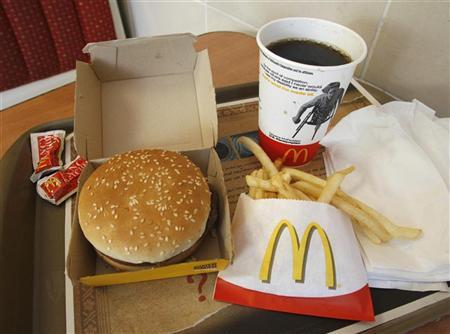McDonald's To End Pork Gestation Crate Use By 2022
Date: 01-Jun-12
Country: CHICAGO
Author: P.J. Huffstutter

A meal consisting of a Quarter Pounder hamburger, french fries and
soft-drink is pictured at a McDonald's restaurant in Los Angeles,
California July 23, 2008.
Photo: Fred Prouser
McDonald's USA said Thursday that by 2022 it will only buy pork from farmers and other sources that do not use gestation stalls for housing its pregnant sows.
In the shorter term, the Oak Brook, Illinois-based fast-food giant said that it would work with producers and suppliers to develop traceability systems to prove that the meats it buys are not from farms that use such structures. The company also said that, by 2017, it would seek to source pork for its U.S. business from producers that are also working to phase out such gestation stalls.
McDonald's, the top U.S. hamburger chain by sales, vowed in February to work with its U.S. pork suppliers to phase out the use of gestation crates, which confine animals during the breeding and post-birth process. The policy shift will apply only to the company's U.S. business, company officials said.
The 10-year plan comes amid an increasingly fierce battle over on-farm practices between farmers and agribusiness on one side and food safety groups and animal-rights organizations on the other.
The Humane Society of the United States, a leading critic of the use of gestation stalls, said Thursday that McDonald's announcement marked the latest victory for animal-rights groups.
"We wish the company planned to get rid of these crates tomorrow, but we understand the logistical challenges involved in making such significant improvements," said Paul Shapiro, vice president of farm animal protection for the Humane Society.
Gestation crates are typically metal enclosures, about 7 feet long and 2 feet wide, in which a breeding sow is housed for much of her adult life.
Pork producers say these enclosures are necessary to protect young piglets from being crushed by larger animals, and to keep sows from fighting as they often will when housed together in larger pens. Animal rights groups say that such stalls constitute inhumane treatment of the animals.
Other companies have either followed suit with their own plans or are vowing similar changes in regards to how they source their meats. Wendy's Co, the No. 2 hamburger chain in the United States, made a similar announcement in March. And pork producers Smithfield Foods Inc and Hormel Foods Corp have said they, too, are phasing out the use of gestation crates in company-owned facilities.
McDonald's said it will take years to shift such production practices in the agricultural industry, in order to ensure that there is enough swine being raised in open-housing in order to meet the volume of pork products that McDonald's purchases.
"There are not enough sows housed in non-gestation crates right now. It's between six- and 10 percent," said Bob Langert, vice president of sustainability for McDonald's. "It can't supply our needs."
![]()
© Thomson Reuters 2012 All rights reserved